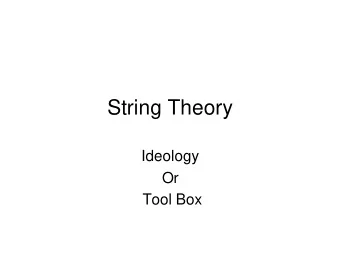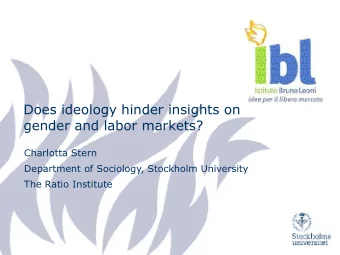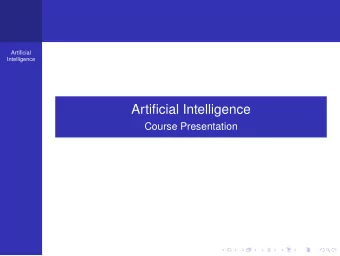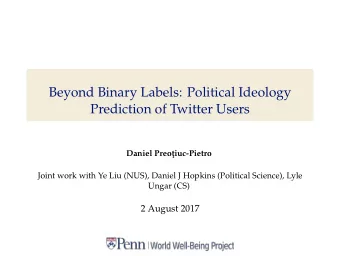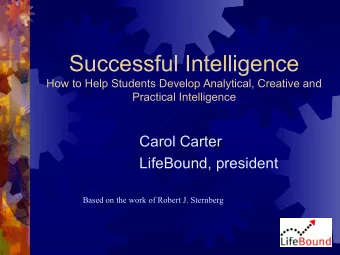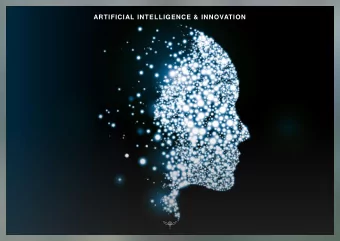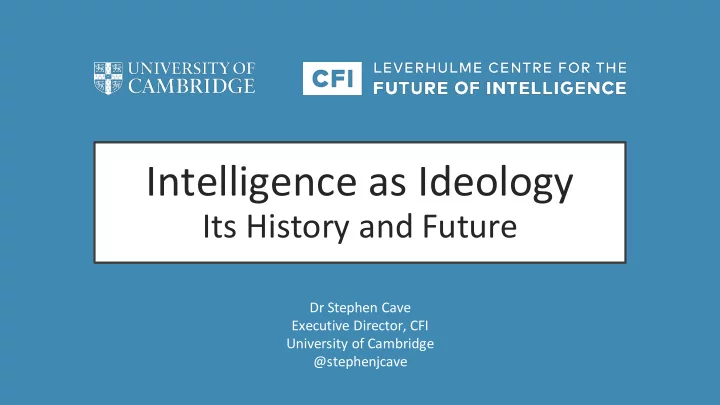
Intelligence as Ideology Its History and Future Dr Stephen Cave - PowerPoint PPT Presentation
Intelligence as Ideology Its History and Future Dr Stephen Cave Executive Director, CFI University of Cambridge @stephenjcave AI NARRATIVES PROJECT Leverhulme Centre for the Future of Intelligence and the Royal Society bit.ly/NarrativesAI
Intelligence as Ideology Its History and Future Dr Stephen Cave Executive Director, CFI University of Cambridge @stephenjcave
AI NARRATIVES PROJECT Leverhulme Centre for the Future of Intelligence and the Royal Society bit.ly/NarrativesAI
Three parts: Part 1: Intelligence as Ideology - its Present Part 2: Intelligence as Ideology - its History Part 3: Intelligence as Ideology - its Future
Three parts: Part 1: Intelligence as Ideology - its Present Part 2: Intelligence as Ideology - its History Part 3: Intelligence as Ideology - its Future
Part 1: Intelligence as Ideology - its Present
Some current widespread views about intelligence:
Some current widespread views about intelligence: 1. Intelligence is a general, unitary capacity
Some current widespread views about intelligence: 1. Intelligence is a general, unitary capacity 2. It can be measured
Some current widespread views about intelligence: 1. Intelligence is a general, unitary capacity 2. It can be measured 3. Intelligence is an (perhaps the most) important determinant of a person’s potential
Some current widespread views about intelligence: 1. Intelligence is a general, unitary capacity 2. It can be measured 3. Intelligence is an (perhaps the most) important determinant of a person’s potential 4. Measurement of intelligence should therefore be used to determine people’s lot in life
“The potential benefits are huge; everything that civilisation has to offer is a product of human intelligence; we cannot predict what we might achieve when this intelligence is magnified by the tools that AI may provide, but the eradication of war, disease, and poverty would be high on anyone's list. Success in creating AI would be the biggest event in human history.” Hawking, Russell, Tegmark, Wilczek 2014
“The potential benefits are huge; everything that civilisation has to offer is a product of human intelligence; we cannot predict what we might achieve when this intelligence is magnified by the tools that AI may provide, but the eradication of war, disease, and poverty would be high on anyone's list. Success in creating AI would be the biggest event in human history.” Hawking, Russell, Tegmark, Wilczek 2014
“Looking further ahead, there are no fundamental limits to what can be achieved: there is no physical law precluding particles from being organised in ways that perform even more advanced computations than the arrangements of particles in human brains. An explosive transition is possible... machines with superhuman intelligence could repeatedly improve their design even further.” Hawking, Russell, Tegmark, Wilczek 2014
Three parts: Part 1: Intelligence as Ideology - its Present Part 2: Intelligence as Ideology - its History Part 3: Intelligence as Ideology - its Future
Part 2: Intelligence as Ideology - its History
Two themes historically in tension: 1. Many people think intelligence does not distinguish people and is not particularly important. 2. Some people (like Plato and Aristotle) think intelligence does distinguish people and is very important -- and can be used to justify and naturalise a dominance hierarchy.
“There is a physical difference between the white and black races which I believe will forever forbid the two races living together on terms of social and political equality. And inasmuch as they cannot so live, while they do remain together there must be the position of superior and inferior, and I as much as any other man am in favour of having the superior position assigned to the white race.” Abraham Lincoln
Francis Galton, FRS Hereditary Genius , 1869
“You have made a convert of an opponent in one sense, for I have always maintained that, excepting fools, men did not differ much in intellect, only in zeal and hard work.” Charles Darwin to Francis Galton
“The tests have told the truth… Their dullness seems to be racial, or at least inherent in the family stocks from which they came.” Lewis Terman, inventor of the Stanford-Binet IQ test, 1916
“It is also possible to make a picture of the elements now entering into American intelligence. At one extreme we have the distribution of the Nordic race group. At the other extreme we have the American negro. Between the Nordic and the negro, but closer to the negro than to the Nordic, we find the Alpine and Mediterranean types.” Carl Brigham, inventor of the SAT, 1923
Three parts: Part 1: Intelligence as Ideology - its Present Part 2: Intelligence as Ideology - its History Part 3: Intelligence as Ideology - its Future
Part 3: Intelligence as Ideology - its Future
“The potential benefits are huge; everything that civilisation has to offer is a product of human intelligence; we cannot predict what we might achieve when this intelligence is magnified by the tools that AI may provide, but the eradication of war, disease, and poverty would be high on anyone's list. Success in creating AI would be the biggest event in human history.” Hawking, Russell, Tegmark, Wilczek 2014
The ideology of intelligence in the age of AI: 1. Favours the white, privileged western male eg , perpetuates biased cult of ‘brilliance’ 2. Misdirects concerns about the impact of AI eg , towards risk of ‘superintelligence’, or towards professional workers
Intelligence as Ideology Its History and Future Dr Stephen Cave Executive Director, CFI University of Cambridge @stephenjcave
Recommend
More recommend
Explore More Topics
Stay informed with curated content and fresh updates.
